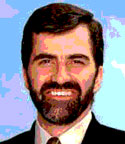 Forget the Gore Effect ((The occurrence of cold weather in a place where Al Gore talks about global warming )), Chicago — and much of the eastern half of the continental USA — is now experiencing the Bast Effect — a record March heatwave in the Heartland of climate denial. The figures for this heatwave are truly extraordinary. Here’s Jeff Masters:
Forget the Gore Effect ((The occurrence of cold weather in a place where Al Gore talks about global warming )), Chicago — and much of the eastern half of the continental USA — is now experiencing the Bast Effect — a record March heatwave in the Heartland of climate denial. The figures for this heatwave are truly extraordinary. Here’s Jeff Masters:
For the third consecutive day, Chicago, Illinois hit their warmest temperature on record so early in the year, going back to 1872. The mercury hit 82°F, giving the city its third consecutive day of 80°+ temperatures, smashing the old record by a month. Previously, the earliest Chicago had ever seen three consecutive 80 degree days was back on April 14 – 16, 1976.
Masters quotes the National Weather Service:
Chicago and Rockford have both broken high temperature records 3 days in a row and will likely break record highs for 5 days in a row. There is even the potential they could tie or break record highs for 6 or 7 days in a row depending on how warm temperatures get on Monday and Tuesday. It is extraordinarily rare for climate locations with 100+ year long periods of records to break records day after day after day. At the current pace… it is likely that Chicago and Rockford will not only break… but shatter their current record warmest Marches.
Joe Romm at Climate Progress has a very useful overview of the event, drawing heavily on the views of Masters and the Weather Channel’s Stu Ostro.
Even the most committed US denier can’t fail to notice midsummer weather happening in March, coming on top of a very mild winter. This is exactly the sort of extreme weather event that can drive public opinion in the direction of the need for action. It’s large, widespread and not too damaging (so far), yet undeniable. One can only hope that US politicians notice. And it might be a good idea to invite Bast to give a few talks outside Illinois…
[Badly Drawn Boy]
Like this:
Like Loading...
 Extreme weather events are where the climate change rubber hits the road, and if events over the last month are anything to go by, global warming is currently doing doughnuts and burnouts on tarmac right round the globe. Kevin Trenberth put it rather nicely in an interview with PBS Newshour in the US: “This is a view of the future, so watch out.” John Vidal in The Guardian sums up the situation rather well:
Extreme weather events are where the climate change rubber hits the road, and if events over the last month are anything to go by, global warming is currently doing doughnuts and burnouts on tarmac right round the globe. Kevin Trenberth put it rather nicely in an interview with PBS Newshour in the US: “This is a view of the future, so watch out.” John Vidal in The Guardian sums up the situation rather well:
 What happens when you deny things? Well, if you deny the reality of global warming, and if you are to be in any way self-consistent, then you have to deny every bit of evidence that it might be happening. Here’s a classic example, drawn from New Zealand’s very own little corner of the climate crank echo chamber, Richard Treadgold’s “Climate Conversation Group” blog. Treadgold concludes
What happens when you deny things? Well, if you deny the reality of global warming, and if you are to be in any way self-consistent, then you have to deny every bit of evidence that it might be happening. Here’s a classic example, drawn from New Zealand’s very own little corner of the climate crank echo chamber, Richard Treadgold’s “Climate Conversation Group” blog. Treadgold concludes  Forget the Gore Effect ((
Forget the Gore Effect (( James Hansen and two fellow-authors have circulated a new paper which they will be submitting for publication,
James Hansen and two fellow-authors have circulated a new paper which they will be submitting for publication,  ‘Tis the
‘Tis the